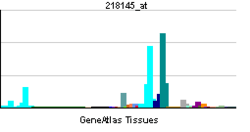TRIB3
Tribbles homolog 3 is a protein that in humans is encoded by the TRIB3 gene.[1][2][3]
Function
The protein encoded by this gene is a putative protein kinase that is induced by the transcription factor NF-kappaB. The encoded protein is a negative regulator of NF-kappaB, and can also sensitize cells to TNF- and TRAIL-induced apoptosis. In addition, this protein can negatively regulate the cell survival serine-threonine kinase AKT1.[3]
Interactions
TRIB3 has been shown to interact with:
References
- ↑ 1.0 1.1 Du K, Herzig S, Kulkarni RN, Montminy M (Jun 2003). "TRB3: a tribbles homolog that inhibits Akt/PKB activation by insulin in liver". Science 300 (5625): 1574–7. doi:10.1126/science.1079817. PMID 12791994.
- ↑ Hegedus Z, Czibula A, Kiss-Toth E (Aug 2006). "Tribbles: novel regulators of cell function; evolutionary aspects". Cell Mol Life Sci 63 (14): 1632–41. doi:10.1007/s00018-006-6007-9. PMID 16715410.
- ↑ 3.0 3.1 "Entrez Gene: TRIB3 tribbles homolog 3 (Drosophila)".
- ↑ 4.0 4.1 4.2 4.3 Zhou Y, Li L, Liu Q, Xing G, Kuai X, Sun J, Yin X, Wang J, Zhang L, He F (May 2008). "E3 ubiquitin ligase SIAH1 mediates ubiquitination and degradation of TRB3". Cell. Signal. 20 (5): 942–8. doi:10.1016/j.cellsig.2008.01.010. PMID 18276110.
- ↑ Bowers AJ, Scully S, Boylan JF (May 2003). "SKIP3, a novel Drosophila tribbles ortholog, is overexpressed in human tumors and is regulated by hypoxia". Oncogene 22 (18): 2823–35. doi:10.1038/sj.onc.1206367. PMID 12743605.
- ↑ Wu M, Xu LG, Zhai Z, Shu HB (July 2003). "SINK is a p65-interacting negative regulator of NF-kappaB-dependent transcription". J. Biol. Chem. 278 (29): 27072–9. doi:10.1074/jbc.M209814200. PMID 12736262.
Further reading
- Maruyama K, Sugano S (1994). "Oligo-capping: a simple method to replace the cap structure of eukaryotic mRNAs with oligoribonucleotides.". Gene 138 (1-2): 171–4. doi:10.1016/0378-1119(94)90802-8. PMID 8125298.
- Suzuki Y, Yoshitomo-Nakagawa K, Maruyama K et al. (1997). "Construction and characterization of a full length-enriched and a 5'-end-enriched cDNA library.". Gene 200 (1-2): 149–56. doi:10.1016/S0378-1119(97)00411-3. PMID 9373149.
- Deloukas P, Matthews LH, Ashurst J et al. (2002). "The DNA sequence and comparative analysis of human chromosome 20.". Nature 414 (6866): 865–71. doi:10.1038/414865a. PMID 11780052.
- Strausberg RL, Feingold EA, Grouse LH et al. (2003). "Generation and initial analysis of more than 15,000 full-length human and mouse cDNA sequences.". Proc. Natl. Acad. Sci. U.S.A. 99 (26): 16899–903. doi:10.1073/pnas.242603899. PMC 139241. PMID 12477932.
- Wu M, Xu LG, Zhai Z, Shu HB (2003). "SINK is a p65-interacting negative regulator of NF-kappaB-dependent transcription.". J. Biol. Chem. 278 (29): 27072–9. doi:10.1074/jbc.M209814200. PMID 12736262.
- Bowers AJ, Scully S, Boylan JF (2003). "SKIP3, a novel Drosophila tribbles ortholog, is overexpressed in human tumors and is regulated by hypoxia.". Oncogene 22 (18): 2823–35. doi:10.1038/sj.onc.1206367. PMID 12743605.
- Huang J, Teng L, Liu T et al. (2003). "Identification of a novel serine/threonine kinase that inhibits TNF-induced NF-kappaB activation and p53-induced transcription.". Biochem. Biophys. Res. Commun. 309 (4): 774–8. doi:10.1016/j.bbrc.2003.08.069. PMID 13679039.
- Ota T, Suzuki Y, Nishikawa T et al. (2004). "Complete sequencing and characterization of 21,243 full-length human cDNAs.". Nat. Genet. 36 (1): 40–5. doi:10.1038/ng1285. PMID 14702039.
- Kiss-Toth E, Bagstaff SM, Sung HY et al. (2004). "Human tribbles, a protein family controlling mitogen-activated protein kinase cascades.". J. Biol. Chem. 279 (41): 42703–8. doi:10.1074/jbc.M407732200. PMID 15299019.
- Gerhard DS, Wagner L, Feingold EA et al. (2004). "The status, quality, and expansion of the NIH full-length cDNA project: the Mammalian Gene Collection (MGC).". Genome Res. 14 (10B): 2121–7. doi:10.1101/gr.2596504. PMC 528928. PMID 15489334.
- Ohoka N, Yoshii S, Hattori T et al. (2005). "TRB3, a novel ER stress-inducible gene, is induced via ATF4-CHOP pathway and is involved in cell death.". EMBO J. 24 (6): 1243–55. doi:10.1038/sj.emboj.7600596. PMC 556400. PMID 15775988.
- Ord D, Ord T (2005). "Characterization of human NIPK (TRB3, SKIP3) gene activation in stressful conditions.". Biochem. Biophys. Res. Commun. 330 (1): 210–8. doi:10.1016/j.bbrc.2005.02.149. PMID 15781252.
- Prudente S, Hribal ML, Flex E et al. (2005). "The functional Q84R polymorphism of mammalian Tribbles homolog TRB3 is associated with insulin resistance and related cardiovascular risk in Caucasians from Italy.". Diabetes 54 (9): 2807–11. doi:10.2337/diabetes.54.9.2807. PMID 16123373.
- Schwarzer R, Dames S, Tondera D et al. (2006). "TRB3 is a PI 3-kinase dependent indicator for nutrient starvation.". Cell. Signal. 18 (6): 899–909. doi:10.1016/j.cellsig.2005.08.002. PMID 16129579.
- Stelzl U, Worm U, Lalowski M et al. (2005). "A human protein-protein interaction network: a resource for annotating the proteome.". Cell 122 (6): 957–68. doi:10.1016/j.cell.2005.08.029. PMID 16169070.
- Matsushima R, Harada N, Webster NJ et al. (2006). "Effect of TRB3 on insulin and nutrient-stimulated hepatic p70 S6 kinase activity.". J. Biol. Chem. 281 (40): 29719–29. doi:10.1074/jbc.M511636200. PMID 16887816.
- Koh HJ, Arnolds DE, Fujii N et al. (2007). "Skeletal muscle-selective knockout of LKB1 increases insulin sensitivity, improves glucose homeostasis, and decreases TRB3.". Mol. Cell. Biol. 26 (22): 8217–27. doi:10.1128/MCB.00979-06. PMC 1636784. PMID 16966378.
| |||||||||||||||||||||||||||||||||||||||||||||||||||||||||||||||||||||||||||||||||||||||||||||||||||||||||||||||||||||||||||||||||||||||||||||||||||||||||||||||||
